- Home
- Rebecca Levene
The Quartz Massacre Page 2
The Quartz Massacre Read online
Page 2
Bagman and Rogue never spoke to each other or to anyone else about what they'd seen, but Rogue saw a change in his friend after that. Where before his humour had come from a light-hearted, uncaring place, it now seemed to come from somewhere darker. He worked harder, too, striving to excel in everything they learnt. The Gene Genies were delighted: it seemed to them that one of the weakest of the squad had suddenly found his fighting spirit. But Rogue knew why Bagman was really trying so hard, why his jokes were so barbed. Every day, he lived in fear that he'd fail, that the Gene Genies would find him as obsolete as the mutants hidden behind the airlock, and he'd be sent to live there with them, waiting forever for a call which would never come.
Bagman feared this, but Bagman didn't know what Rogue knew. When Rogue had emerged through the mutants' airlock door with Bagman slung unconscious over his shoulders, it had been to find the Gene Genies waiting for them.
They were furious - and they were scared. First, they forbade Rogue to speak of what he'd seen. Then, with Rogue watching, they jettisoned the lab holding the mutants from the station. When it was free, floating in space, they blew it up.
"We made it detachable as a contingency," one of the Gene Genies told him coldly. "Perhaps we should have done this long ago. Erased our mistakes." The Genie's icy blue eyes bored into Rogue's, making sure he understood every implication of his words.
And Rogue did. He knew then why the Genies would never use their names. They didn't want to see the GIs as people, because people weren't expendable, and the GIs were.
After that, Rogue kept as close an eye as he could on what their trainers were doing and saying, and made sure to pass every test with flying colours. He did what he could to help his friends do the same.
The training got harder each year. When they were thirteen, military prisoners, deserters scheduled for execution, were shipped over to Milli-Com from one of the many battlefields of the war. The prisoners were given knives and told that if they could kill one of the GIs, they could walk free. The GIs weren't armed.
The other GIs weren't scared. They'd been told often enough that they were the best of the best, superhuman, a match for ten ordinary men, but Rogue was wary. He knew that a knife could kill, in anyone's hand.
One of the GIs lost an ear; another had the tough tendons in his knee severed. Both injuries could have been healed, cloned flesh regrown, but the troopers were flunked out of the programme. Rogue never saw them again.
When he saw a knife plunging towards his own chest, he ducked under the swinging blade to bring himself out behind his opponent's head, a great hulking man with ebony skin and a desperate expression on his face. Then Rogue took the man's head in his hands and snapped.
It was his first kill. The Gene Genies told the GIs they were real soldiers. They said that they'd grow to love the kill, that there was no feeling like the feeling of ridding the universe of one more filthy Nort. Rogue didn't think that this was something he'd ever grow to love, but he could already tell that it was something he was good at.
When they were fifteen, they met the Dolls for the first time. The Gene Genies must have been keeping them on some other satellite base, away from the GIs and their all-too-human adolescent hormones. For some reason, they had decided that the time was right for the GIs to meet their female counterparts.
The GIs were lined up, standing at attention, then the Dolls marched in. Rogue felt something like a collective indrawn breath from his fellow troopers. They'd seen women before, of course; many of the Milli-Com personnel were female, but they'd never seen women who were like them before: blue skin, white hair, muscles bulging beneath their standard military-issue jerkins.
They were clones, just like the GIs. And just like the GIs, they couldn't have been more different from one another. Rogue spotted her straightaway, the Doll he'd later learn called herself Venus Bluegenes. They all had names like that, names with a sense of humour, creative names that they must have spent some time thinking up. It made Rogue slightly ashamed of the unimaginative names the GIs had all given themselves.
The Gene Genies told them that the Dolls were strictly support personnel. They were getting weapons training as a precaution, nothing more. But Rogue looked at the way the Dolls handled their guns, so competently, and the ease with which they passed every test, and he wondered. He looked at Venus in particular. The way she smiled with just half her mouth, as if smiling too much would reveal secrets she wasn't willing to share. The way her eyebrows curved over her eyes like question marks. The way she walked.
Helm caught him looking. "She's mine," he said, one hand clasped to the hilt of his belt knife in a threatening gesture that might or might not have been conscious.
Rogue laughed. "Don't think she belongs to anyone."
But Helm didn't find it funny. "I mean it," he said. "I like her, Rogue, and she likes me."
"In that case," Rogue said, "what have you got to worry about?"
After that, he stayed away from Venus. He didn't want to cause any trouble with Helm, who often seemed to be looking for a reason to pick a fight with Rogue. No one mocked Helm for his obsessions any more. All his knowledge, as he'd told them it would, had cohered over the years into a tactical mind that was second only to Rogue's. But that wasn't good enough for Helm. He wanted to be first. Rogue had no intention of ceding that position to him, though if letting him win Venus would keep Helm off his back, he was willing to do that.
Sometimes he'd catch Venus smiling at him, looking at him with considering eyes.
When they were eighteen, they graduated from "school" to full military drill. Gunnar loved it. He loved the smell of real ammunition, the mock battles they fought, the adrenaline surge. But he wasn't satisfied with war games, he wanted the real thing.
"When are we gonna see some action?" he asked. "I want to shoot something for real."
"They'll send us planetside soon enough," Rogue told him. "They didn't spend all these years training us just to let us stew in space."
But Gunnar didn't look satisfied. His white eyes were narrowed into angry slits, trying to see into a future where he'd be firing real guns into real enemies and spilling real blood.
When they were twenty, finally ready to face that future, Rogue discovered that for Gunnar it might never come.
"Computer reveals a slight instability," Rogue heard the Gene Genie say, and when he peered around the doorway he'd been leaning against, field-stripping his gun, he saw that the man was looking at Gunnar's file.
"Can't risk him in the field," said a second Gene Genie, one of the highest ranking on the station.
The first Gene Genie frowned. "Guess he'll have to stay on Milli-Com then," he said. "Talk about a waste of resources." Then they seemed to sense Rogue loitering outside and the door hissed shut on rusty hydraulics.
Rogue didn't tell Gunnar. How could he? He waited for the hammer to fall, and wondered how his friend would take it.
Weeks went by, nothing happened and it came to the day before their passing out ceremony. No official announcement had been made, though they knew through the sort of process of osmosis that seems to operate in all military establishments that they were due to ship out very soon. The blue-green planet that had hovered below them for all of Rogue's life had disappeared six weeks ago. Shortly after that, great shutters had been brought down over all the station's viewports. Milli-Com was on the move.
The satellite, stationary and hidden for so long, was finally heading for the heart of the war, taking its precious cargo with it. The GIs would soon see some real action.
Everyone tackled the routine drills, the monotonous training exercises and the endless equipment checks with renewed vigour. For years, the Gene Genies had told them not to slack off, not to grow bored, that one day their lives would depend on getting these things right. Finally, they really believed it.
There was a jittery, hopped-up atmosphere on the station. Everything, everyone, felt on the edge of violence. Gunnar's hand twitched constantly a
few inches from the energy gun at his belt, itching to draw it. Bagman couldn't stop talking, as if terrified of what might come to fill any silence he left. Helm glared at Rogue whenever he was within ten feet of Venus, just waiting for an excuse.
Finally, from under their feet, subliminal but felt deeply , came the muted roar of the station's thrusters, bringing it to a halt at its final destination. The top brass arrived to witness this momentous event. An array of generals, medals they'd probably never earned glittering on their chests, paraded through the corridors that the GIs had thought of as their own. They watched the GIs train and they watched them fight and they watched them eat. Though they didn't say anything, Rogue tried as hard as he could to read their expressions and decided that they seemed pleased with the result of their long experiment.
When one of the generals walked into the room where Rogue, Gunnar and three of the others were reacquainting themselves with the digi-map of Nu Earth (though they'd memorised every hill and river long ago), Rogue thought that he didn't look so pleased. The general was a good-looking man, probably no older than forty, young to have reached his rank and with the look of smug satisfaction that went with that achievement. His eyes, a light grass green, glittered in the light of the halo-lamps overhead.
Rogue found that he didn't like him. Maybe that was because he'd guessed what the general had come to say.
The wall of the chamber was lined with canisters of gas toxins, all of which Rogue and the others had been exposed to at one time or another. A normal human would find them lethal, most within a matter of seconds. Rogue had found them no more than unpleasant. The worst they'd left him with was a tight itchy pain in the back of his throat.
"Trooper G," the general said, when they'd all snapped smartly to attention, "front and centre!"
Then, before he could say any more, the station juddered violently. The general was thrown to the floor with a loud gasp of shock and pain. The troopers tumbled to their knees, rifles leaping into their hands to face the threat.
"Asteroid storm! Asteroid storm!" the intercom blared out loudly, and the troopers relaxed, re-holstering their guns. The general began to climb back to his feet, his face sharp with annoyance to have had his dignity compromised in this way.
Then the second rock struck and the impact knocked one of the canisters of toxin from the wall.
Without conscious thought, Rogue flung himself towards it, but he was simply too far away. His fingers just brushed the edge of the metal frame as it struck the floor and the glass within it shattered.
The cloud of toxin it released was colourless. Rogue was only able to detect its presence by a faint tang of apple in the air, but the effect on the general was instant. His hands leapt to his throat, clasping it in agony as he let out a bubbling scream of pain and a pink froth erupted from his lips.
With cold, clinical detachment, Rogue thought: Agent PDP, death in three seconds. He saw Tank dive for the door and knew that he was heading for the chem masks, but no matter how quick he was, the general would never be able to mask-up in time. Rogue's mind working at speed, considering then rejecting possibilities. Blocking the general's airways, shooting a hole in the station's hull to let the gas out, breathing the clean air from his own lungs into the general's.
The general's face was already breaking out in the virulent red pustules of the toxin, the symptoms which had given it the nickname of the "polka-dot plague", when Rogue saw the answer. And the moment he saw it, he saw that it was the answer to another problem, too.
"Gunnar, shoot out the de-chem flasks!" he shouted. "All of them!"
Obeying orders was something else they'd all had drilled into them for longer than their memories went back, and while Rogue wasn't Gunnar's commanding officer, his unmatched tactical skill and combat abilities had earned him the other GI's respect. Gunnar didn't even hesitate - he just brought up his rifle and fired. The general was writhing in fear and pain, limbs flailing into the path of Gunnar's rounds, but not one of them hit him. There was no marksman among the GIs more accurate than Gunnar.
The deafening roar of rifle fire was soon joined by the sharp reports of glass vessels imploding. A second later, Rogue felt the cool rush of the antitoxin filling the room, and he saw the general's hands fall away from his face, where the vicious red welts were already fading. Strangely, the antitoxin had a far less pleasant smell than the toxin itself, something like the musty odour of a uniform that had been worn for a week, then left in a locker for a month.
Rogue saw the general's expression unclench as the man realised that he would live to preen another day. But when he looked at Gunnar, his green eyes filled with a venomous anger, as if the toxin had somehow seeped inside them.
An instant later the expression was gone, replaced by the general's usual deep self-satisfaction, and before Rogue could think about it further the doors of the room hissed open and the room became full of Gene Genies and GIs, clustering around the general with medpacs in hand and slapping Gunnar on the back. Rogue settled back onto his haunches, satisfied. Gunnar was the hero of the hour. There was no way he wouldn't be shipping out now.
Finally, the day came. The passing out parade and, more importantly, the mission briefing. The GIs stood in ranks, rigidly at attention under the glaring halo lamps high up in the vaulted ceiling of the Parade Ground, the vast central chamber of Milli-Com. The artificial gravity was weaker here, and Rogue could feel his feet trying to drift up from the floor, as if his body couldn't wait to fling itself into space and down to the planet's surface below.
"Men, this is it," General Aitchison said, his voice stuttering over the word "men" as if he wasn't quite sure it applied to the blue-skinned beings standing in front of him.
Rogue felt a collective sound, a hitching of breath, go through the men around him. He didn't shift his position, but his eyes flicked right and left, taking in the suddenly tense muscles of those around him, the fire in their eyes. He knew the same fire was burning in his own.
"You know why you were created, you know that you alone are capable of surviving on the surface of Nu Earth, the most crucial battle zone in the whole war. Now you will have the chance to prove yourselves. Are you ready for the challenge? Are you ready to show those Nort scum what real Southers are made of?"
Rogue and the GIs let out a full-throated roar, so loud the station seemed to shake with it. "Southside, Southside, Southside - yeah!"
The general took a step backwards, as if physically pushed by the wall of sound, but Rogue saw him smile. "For twenty years we've kept your existence secret for this very moment, the moment that will turn the tide of war for the South." Then, his voice dropped, as if he was confiding in each of the GIs individually, and the noise in the room dropped with it, every soldier straining to hear his orders, to finally discover where and when his first taste of battle would come.
"Tomorrow night," the general said, "you will be dropped into the Quartz Zone. I'm sure I don't need to tell you the strategic importance of that area. Possessing that critical wedge would allow us to drive between the Nort Scum legions and the Thirteenth Army to the south. But the Norts have never defended that land. They believe that it is impenetrable, too toxic and too wild for any frontal assault."
The general studied the troopers in front of him, a fierce smile on his face. Beside him, the long thin line of high-ranking officers shifted and looked at each other, high on adrenaline. "They're wrong," he said. "You men will take the Quartz Zone. Unprepared, the Nort defences will crumple. And then you'll spearhead the drive that will finally take the whole continent."
Gunnar grinned fiercely. "Those Norts won't know what's hit them."
They hadn't got it quite right. The skin was too blue, too much like a summer sky, the eyes glowed red rather than a blank white, and no Genetic Infantryman, even in the heat of battle, had ever worn an expression quite that deranged, as if his sanity had cracked sometime in the recent past.
But Pietr didn't know that. He stared at the cut-out
shape a hundred feet in front of him, his Lazooka held awkwardly in unfamiliar hands, and wondered how he could ever fight a person, a creature, like that.
The words of the training vid they'd been shown ran in his head. "Uncovered a top-secret project... The genetic infantrymen, corrupt products of degenerate Souther science... these freaks, these genetic abominations, bred for death, able to breathe the poisoned air, able to survive in the toxic hell the Southers have made of Nu Earth, are nothing more than brightly coloured targets for our snipers."
Pietr heaved the weight of the Lazooka into position and fired at the leering head of the blue target in front of him. The energy weapon sprayed a hot bolt of death five feet wide of the target, leaving nothing to show for his shot but the stench of ionised air. He looked around guiltily to see if his brother had noticed his mistake, but the others were all intent on their own target practice, reducing the blue cut-outs to smouldering wrecks. Pietr felt a trickle of sweat veer down his forehead and into his eye, and raised his arm to wipe it off before remembering - for the tenth time - that he was wearing a full-body chem suit. He'd never get used to life on the radiation - and chem-blasted surface of Nu Earth.
So much for knowing your enemy, Pietr thought bitterly. Knowing it and being able to hit it were obviously two different things. "Through strength, through will, through purity, Nordland will prevail." How many times had he heard that over the four months' training he'd been put through before shipping out here? Maybe he didn't have the necessary purity.
Except - he looked to his left, where his brother was putting his tenth shot straight through the target - there was nothing wrong with the purity of his blood. There was just something wrong with him.
He couldn't fight. He should never have joined up. But then his brother had returned from the battles on Epsilon 7, muscles bulging out of his uniform, a man instead of a boy. Their parents had lavished all their attention on him and made jokes about how Jaze was making Nordland safe so that soft young boys like Pietr could bury their heads in books, and Pietr had known that he had no choice. He would become the man his brother was.

 Smiler's Fair: Book I of The Hollow Gods
Smiler's Fair: Book I of The Hollow Gods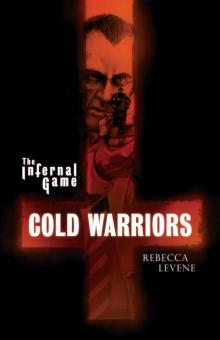 Cold Warriors
Cold Warriors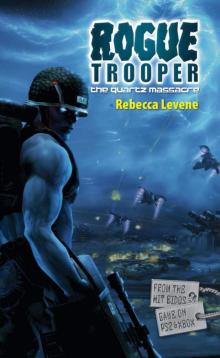 The Quartz Massacre
The Quartz Massacre The Hunter's Kind: Book II of The Hollow Gods
The Hunter's Kind: Book II of The Hollow Gods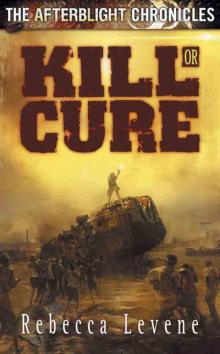 Kill or Cure
Kill or Cure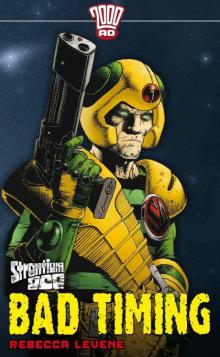 Bad Timing
Bad Timing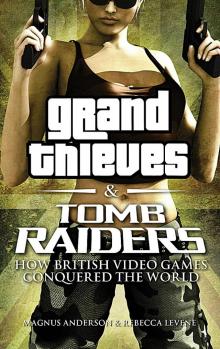 Grand Thieves & Tomb Raiders
Grand Thieves & Tomb Raiders Ghost Dance
Ghost Dance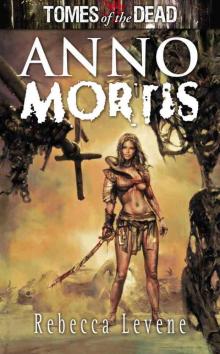 Anno Mortis
Anno Mortis